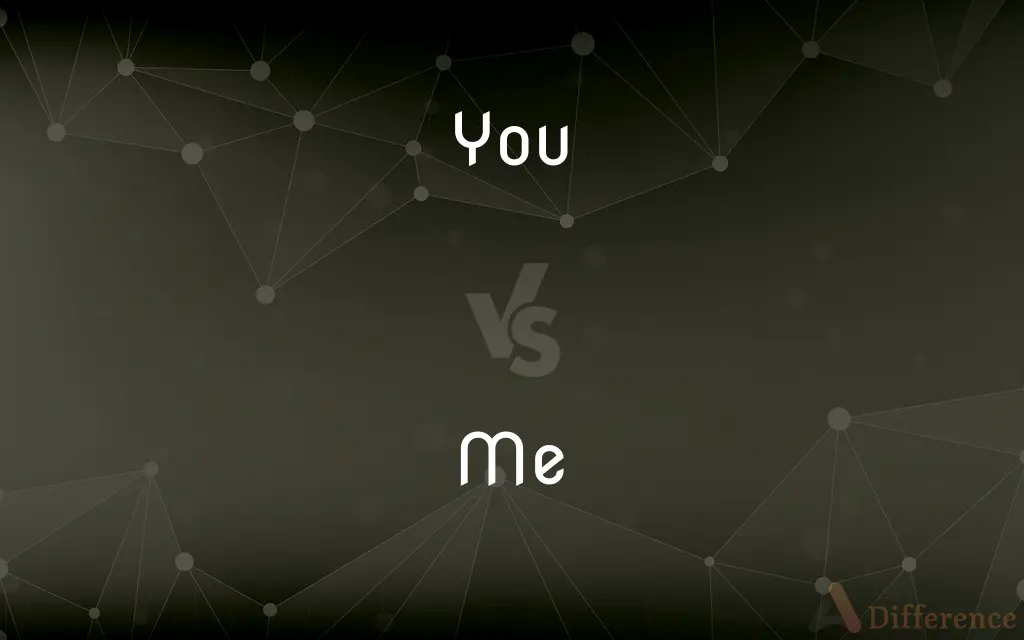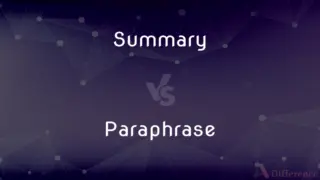You vs. Me — What's the Difference?

Difference Between You and Me
ADVERTISEMENT
Compare with Definitions
You
In Modern English, you is the second-person pronoun. It is grammatically plural, and was historically used only for the dative case, but in most modern dialects is used for all cases and numbers.
Me
The person speaking, regarded as an object; myself; a pronoun of the first person used as the objective and dative case of the pronoum I; as, he struck me; he gave me the money, or he gave the money to me; he got me a hat, or he got a hat for me.
Me rather had my heart might frrl your loveThan my unpleased eye see your courtesy.
You
Used to refer to the person or people that the speaker is addressing
Are you listening?
I love you
Me
Used by a speaker to refer to himself or herself as the object of a verb or preposition
Do you understand me?
Wait for me!
You
Used to refer to any person in general
After a while, you get used to it
ADVERTISEMENT
Me
Used in exclamations
Dear me!
You
(object pronoun) The people spoken, or written to, as an object.
Both of you should get ready now.
Me
A medical condition of unknown cause, with fever, aching, and prolonged tiredness and depression, typically occurring after a viral infection.
You
(To) yourselves, (to) yourself.
Me
As the direct object of a verb.
Can you hear me?
You
(object pronoun) The person spoken to or written to, as an object. (Replacing thee; originally as a mark of respect.)
Me
Myself; as a reflexive direct object of a verb.
You
(subject pronoun) The people spoken to or written to, as a subject. (Replacing ye.)
You are all supposed to do as I tell you.
Me
As the object of a preposition.
Come with me.
You
(subject pronoun) The person spoken to or written to, as a subject. (Originally as a mark of respect.)
Me
As the indirect object of a verb.
He gave me this.
You
(indefinite personal pronoun) Anyone, one; an unspecified individual or group of individuals (as subject or object).
Me
Myself; as a reflexive indirect object of a verb; the ethical dative.
You
The individual or group spoken or written to.
Have you gentlemen come to see the lady who fell backwards off a bus?
Me
As the complement of the copula (be or is).
It wasn't me.
You
Used before epithets, describing the person being addressed, for emphasis.
You idiot!
Me
As the subject of a verb.
Me and my friends played a game.
You
(transitive) To address (a person) using the pronoun you (in the past, especially to use you rather than thou, when you was considered more formal).
Me
As the subject of a verb.
You
The pronoun of the second person, in the nominative, dative, and objective case, indicating the person or persons addressed. See the Note under Ye.
Ye go to Canterbury; God you speed.
Good sir, I do in friendship counsel youTo leave this place.
In vain you tell your parting loverYou wish fair winds may waft him over.
Me
(music) The solfeggio syllable used to indicate the flat of the third note of a major scale.
Me
A state in New England
Share Your Discovery

Previous Comparison
Summary vs. Paraphrase
Next Comparison
Maneuvering vs. Manoeuvring














































